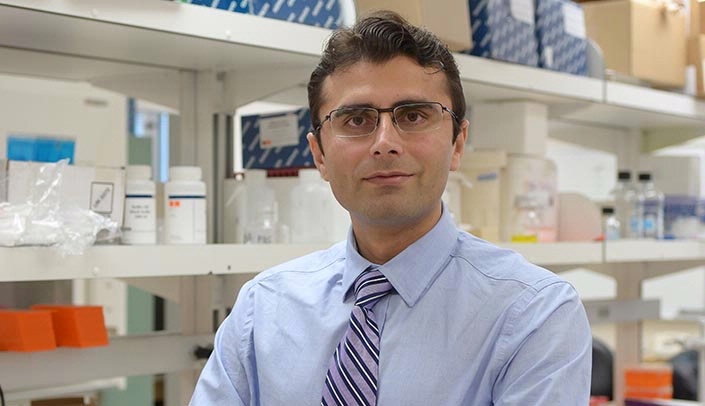Pankaj Singh, Ph.D., professor in the Eppley Institute for Research in Cancer and Allied Diseases, is the corresponding author of a paper published this month in the journal “Cancer Cell.”
Dr. Singh’s paper, “MUC1 and HIF-1alpha Signaling Crosstalk Induces Anabolic Glucose Metabolism to Impart Gemcitabine Resistance to Pancreatic Cancer,” is visible on the journal’s website until Aug. 29.
This is the first study published in the journal that originated from UNMC. “Cancer Cell” is a top-tier journal in the field of cancer research with a 27-impact factor.
Pancreatic cancer strikes more than 53,000 people in the U.S. each year. The one-year survival rate of people with pancreatic cancer who do not have surgery is 29 percent and the five-year survival rate is 7 percent.
Poor survival in pancreatic cancer is due in part to modest response to the existing therapies. Current therapies include mimetics of nucleosides, which get modified and make DNA.
One such mimetic is gemcitabine, which has been used as a therapy, alone or in combination with other drugs, for decades. Studies from Dr. Singh’s lab establish a novel, widely-prevalent mechanism describing how cancer cells respond poorly to therapy by developing resistance.
Resistance to gemcitabine is mediated by a protein called Hypoxia-Inducible Factor1 (HIF1) alpha that changes how cancer cells take up nutrients and increase the levels of nucleosides in cancer cells. Such increased levels of nucleosides dilute the therapy levels in cancer cells and tumors respond poorly.
The recent study in “Cancer Cell” demonstrates that combining gemcitabine with other therapeutic treatments, specifically digoxin or Leflunomide, will decrease resistance to therapy in pancreatic cancer patients. Additionally, imaging for sugar uptake by tumors also demonstrates that pancreatic tumors with high sugar uptake respond poorly to chemotherapies and perhaps would benefit from the novel combination therapies tested in the manuscript in pre-clinical models.
In addition, the manuscript was selected as the issue highlight and received a special commentary from Chi Van Dang, M.D., Ph.D., an eminent scientist in the field of cancer biology.
“The published studies were truly inter- and intra-institutional collaborative studies and would not have been feasible without contributions from each of the basic and clinical investigators who are coauthors on the paper,” Dr. Singh said. “I really appreciate the supportive research environment at the Fred & Pamela Buffett Cancer Center, especially the Specialized Program of Research Excellence (SPORE) leadership by Dr. Tony Hollingsworth and overall support by Dr. Ken Cowan.”
The research also highlights the role of MUC1 mucin protein in causing therapy resistance in pancreatic tumors. An array of technological platforms, such as mass spectrometry-based steady-state metabolomics and kinetic flux metabolomics of stable isotopes, patient-derived xenografts, and CRISPR techniques, which are routine in the lab, were utilized in these studies.
This research was supported by a grant through the American Association for Cancer Research (AACR) and the Pancreatic Cancer Action Network (PanCAN) as well as multiple National Cancer Institute grants.

Congratulations. It's a great accomplishment.
Congratulations Pankaj – outstanding work!
Congratulations !!!!!
Congratulations, Dr. Singh! My husbands family recently lost a dear uncle who fortunately survived three years with pancreatic cancer. This being due in part to a successful surgery and of course the normal forms of cancer treatment. I was so happy to see that advances in treatment are continuing to move, and scientists like yourself are here at UNMC. Thank you!
Congratulations Pankaj. Keep up the great work.
Congratulations Pankaj! Way to go!
Outstanding science, Congratulations Pankaj!
Wonderful finding.
Congratulations to all workers involved